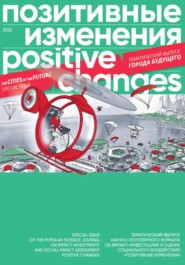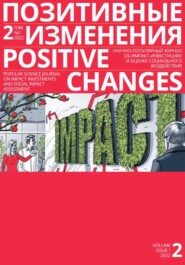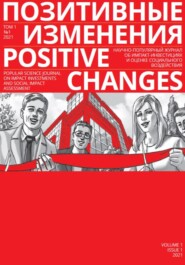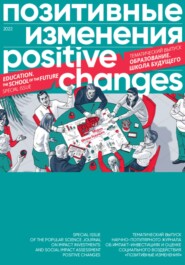По всем вопросам обращайтесь на: info@litportal.ru
(©) 2003-2025.
✖
Позитивные изменения. Том 2, № 2 (2022). Positive changes. Volume 2, Issue 2 (2022)
Настройки чтения
Размер шрифта
Высота строк
Поля
As President Putin says, the world is now undergoing a tectonic shift of global transformation. But what is it, exactly? What is the transformation in question? What exactly is the crisis about? What has caused it and what are the solutions? What will be the exit point that needs to be implemented? The answers to these questions are vital to our entire society. Without them, we will not be able to deal successfully with current and future challenges and threats and will be forced to suffer the damages. Until we find the right answers.
In any case, this is definitely a unique period in history. It marks the end of an era and brings into focus the need to change the entire model of human living and the society as a whole, as well as all individual areas of life. Everything must be revised and readjusted, starting with the humans themselves. The old model was created around building financial gains, and the general consensus was that we needed to achieve that point as a goal, as a point of stability, a point of satisfaction the moment it is reached and thereafter. Throughout human history, we thought that generating financial gains would solve all other problems automatically, or that at least these problems would not be too hard to tackle. But now that we, as a society in general, have reached the goal enough to feel its effects, it is becoming increasingly evident that the problems actually multiply and, most importantly, that the old model fails to solve them. We can see the failure of the old model in every area of life in that it fails to address the problems faced by the society.
Together we will build positive changes, first in one country and then in the whole world.
The reason is we have hit the limits of the current phase in human and social development, while the time does not stop here; it goes on, urging us to move to the next level. The problem, however, is that the current level of our development is deeply, fundamentally different from the next phase, and those differences must be analyzed, accepted, and then brought into life. In the old model, a person could exist as a standalone object, with limited local responsibility, not building his or her own life but passively reacting to what life throws into his or her local area, adapting to the environment and the relevant circumstances. The idea was that one could build one’s own separate happiness by successfully adapting. In the new model, however, the person is a subject, a master of life, actively shaping life and taking responsibility not only for his or her local area, but also for the life of the entire society. You cannot have a healthy liver when your entire body is sick. In order for the liver to stay healthy, one needs to deal with the health of the entire body.
To turn from an object into a subject, the person should understand who he or she is and whether they are capable of effecting the change, and if so, then follow the program for change. It is necessary to develop the person rather than the things around him or her. It is a fundamentally different approach that changes life entirely. It means building everything around the development of the person, his or her qualities and competencies, building life according to a formula: "Everything that contributes to human development is good; everything that does not contribute to development or contributes to degradation is bad." It means realizing that a person’s financial gains are secondary to their personal development. There can be no devastation in a society of developed people. It also means that all the problems we have in life are the result of our underdevelopment, and it is our responsibility to fix it.
There are two fundamental positions to live by:
1. I am ok already, life is not.
2. Life is ok, I am not ok yet.
The first case is the model of developing and improving the environment around a person; the second is the model of developing oneself, and the environment changes as a result of this. We have already tried the first model and came to where we are now; we have not started acting upon the second model yet.
You can take this approach to look at the current state of different countries and parts of the world. From this point of view, the West is a civilization where the main idea is that of financial gains; the East is mainly a civilization of the spirit prevailing over physical life; the South is a civilization attempting to combine the spiritual and financial aspects of life, which, while prioritizing the former, is too focused on its own exclusivity, and is therefore unable to propose an agenda uniting the world; and finally, Russia is also a civilization that combines the spiritual and financial with a focus on the spiritual, but one that has an idea of inclusivity, not exclusivity embedded in its genes.
At previous stages in the society’s development, before we realized the need for a fundamental change in the life order, Russia could not reveal itself and its qualities to the fullest, as other tasks were more relevant for the time: the society was busy building financial gains, something Russia is not very good at. But now Russia’s time has come. Now is the time no one can respond to challenges and threats individually, in isolation. You cannot solve international security problems for any single country, you cannot solve global economic challenges for any single country. Same goes for environmental problems, resource problems, political problems, and so on. In the past, when all countries and nations lived on their own, everyone arranged their lives the way they saw fit. But today the world is technologically and informationally united. Now we all have to get together and answer one question: "How are we going to live together?" The question is non-prejudiced. There is no undoing or eliminating the existing uniting factors. There is no turning time back either. This means we have to build a united world, one way or another. But in order to do this, we need something that will unite us. What idea is fit to rule this world? This is a question we all have to answer.
It is important to understand there are no alternatives to being united, like it or not. The challenges and threats of today, and the risks they carry, are already making us realize this. This realization will only grow with each passing day.
Unification can be voluntary or forced. Forced unification is unification basing on external factors. And these factors are likely to be violent to some extent, or at least very unpleasant to us. This form of unification implies external regulation of human lives and activities. Unification is needed to stabilize the system, to ensure safety and to avoid destruction. Whenever a system cannot stabilize itself, it requires external stabilization. Otherwise it will enter a self-destructive state and eventually collapse. External regulation always implies suppressing the functions that the system is unable to operate and take under control. The voluntary unification procedure, on the other hand, assumes developing the system, so it can perform its functions efficiently enough to manage and stabilize itself.
In the new model, however, the person is a subject, a master of life, actively shaping life and taking responsibility not only for his or her local area, but also for the life of the entire society.
Since the current global challenges cannot be tackled locally by each country acting on its own, and warrant a common unified system-wide response, the society must be united to find a voluntary and favorable way out of the situation. This requires a common denominator for all people, one that can be used to build a common system, common rules, a common world. This must be a universal value that is acceptable and rewarding for everyone. Without this universal value, global challenge cannot be efficiently addressed. We need to solve the equation of life for all people on Earth by finding a universal answer that fits everyone and is shared by everyone.
Russia is currently the one part of the society that is capable of developing and implementing a unifying idea of living together on a global scale. Russia has the necessary historical experience of different ethnicities, with very different identities, coexisting peacefully, their identity not lost, enjoying support and in many cases developing without conflicts. The very spirit of Russia suggests acceptance and support. But in order for Russia to successfully reunite the world, it must first develop and implement this unity within.
Current events clearly show that Russia needs to redesign itself in a new, updated form. Naturally, this new design must be based on the genotype of «Russianness», on the timeless values of the Russian world. The country must find its universal, authentic idea. Many a lance has been broken over Russia’s national idea. The answer is yet to be found. All because the process is pointless and useless. Russia has no national idea. Russia’s idea is supranational. If you put it down in one word, that word would be «goodness». And that goodness is global. It does not stop at anything or anywhere. It seeks to spread itself everywhere, within the boundaries of the entire human society. In case anyone has doubts about understanding the concept of «goodness», the idea is actually quite clear and unambiguous: «goodness» is an intrinsic human quality, which means prioritizing self-giving in favor of other people rather than pursuing own interests. And this is a very important, fundamental criterion that defines the essence of a human and allows us to distinguish a person whose aim is positive creation from a person whose aim is destruction, in one way or another, because the latter would in any case oppose his or her interests to the interests of other people. The «goodness» is inherent in every person by nature, but not everyone displays it in practice. And it is solely a question of each of us choosing what is more important to us, what is dearer, what we consider primary and paramount and what is secondary – internal or external, general or private, the heart or narrow personal interests. In a sense, one could even say that to be human is to nurtue this vector of development in oneself. There is a saying in Russia: "We are all people, we are all humans". It makes sense to change it as follows: "We are all people, but not all of us are humans", which would mean that we have yet to become humans.
Current events clearly show that Russia needs to redesign itself in a new, updated form.
Russia’s new design should be built exactly around the idea of «goodness», as the concept of prioritizing universal human qualities, values, meanings and ideals, which should be realized in the creation of a corresponding society.
This implies a shift from developing things around a person and his or her own wealth (in the sense of receiving financial gains) to a focus on the actual person and developing him or her, his/her qualities and competencies.
There is often confusion about the exact meaning of taking care about humans and their well-being. Often people understand this as a concern to make the situation better for a person, to meet their needs, to provide an effortless life. But the fact is, this is a trap that many people have fallen into. You do not have to improve a person’s surroundings, you have to improve that person instead. When we make life better for someone, we proceed from the assumption "I am ok already, life is not". This invariably leads to a degradation of that person, his/her qualities and competencies. When we improve the actual person, we contribute to their development, and financial gains are an inherent side effect, a natural consequence. Therefore, it is very important to clearly understand the difference and not to confuse the two models, which vary slightly on the outside, but ultimately lead in two opposite directions.
Russia has no national idea. Russia's idea is supranational. If you put it down in one word, that word would be «goodness». And that goodness is global.
The design of a global society building a better human will apparently become a «window» from the stalemate of the current scenario, in which the train is rushing into the abyss at breakneck speed. This is definitely a project that will provide a positive outcome to the current global situation.
As part of the implementation of the new social design focused on human development in Russia, it is vital that the respective institutions are created to be in charge of generating the positive change and turning the social progress towards the new vector, from the current model to a new one. This is where it is important to revise and rearrange literally everything, to build every area of life in a new way. This includes security, economy, science, culture, education, technology, etc.
Each area needs its own development institution. Apart from this, a unified development institute should be created that would set goals, work out unified approaches, methods, generalize policies and feedback, perform coordination and monitoring. Tentatively, that institution could be called «RosRazvitie» (Russian Development).
This is the exact reason why the Positive Changes Factory has been established, to start doing something in that direction without further delays. It is an agency that initiates, creates and develops various projects, enterprises acting as models of a positive future, and produces such models as well.
The factory seeks cooperation with a broad range of projects, enterprises, corporations, opinion leaders, top-ranking experts, public and state figures, state authorities interested in jointly generating the positive change in the society.
Russia has everything it needs to start building a society of positive change, a society of positive future: from the collectivist spirit that is inherent in the Russian people to the practical experience of building large social formation projects. Being «Russian» in this context is not a term describing ethnicity; it is an adjective that denotes belonging to a certain type of moral choice, as discussed above, a choice where self-giving for the benefit of others takes precedence over one’s own gains. This position is inherent in all humans, and it is the foundation on which we together will build a Society of Humanity, a society of global responsibility, understanding, morality, and personal development for everyone.
Together we will build positive change, first in one country and then in the whole world. Essentially, that is the only positive choice we have today. Full speed ahead, Russia!
Экспертные мнения / Expert Opinions
Игра вдолгую: точки роста и перспективы Social Impact Bonds в России
Проекты социального воздействия, они же Social Impact Bonds (SIB), – это форма реализации социальных проектов, которая объединяет игроков из нескольких секторов экономики. В России этот рынок только начал зарождаться. В инвестирование проектов социального воздействия уже вложено около 200 млн рублей, т. е. около 3 млн долларов. Апробация модели SIB в России идет четвертый год, и только первый проект подходит к завершению. Однако заинтересованные игроки и профессионалы уже не раз обсуждали актуальность модели, ее преимущества и потенциал. Мы решили узнать у экспертов, каковы перспективы, сдерживающие факторы и точки роста у проектов социального воздействия в России.
Юлия Вяткина
Редактор журнала «Позитивные изменения»
ПИЛОТНАЯ АПРОБАЦИЯ
Официальный старт запуску проектов социального воздействия в нашей стране дало постановление Правительства Российской Федерации, устанавливающее порядок проведения в регионах РФ в 2019–2024 годах пилотной апробации проектов социального воздействия. Роль драйвера этого инструмента в России взял на себя ВЭБ.РФ. В качестве оператора проектов социального воздействия ВЭБ.РФ обеспечивает проведение финансовой экспертизы, помогает в разработке проекта и определении основных параметров, содействует оформлению необходимой документации, а также организует сквозной мониторинг реализации проекта и процедуру независимой оценки.
В феврале 2022 года в работу по реализации проектов социального воздействия в России включилось Агентство стратегических инициатив (АСИ). Таким образом, АСИ теперь работает как один из операторов проектов социального воздействия в РФ.
В настоящее время в нашей стране запущено 7 проектов социального воздействия по приоритетным направлениям: образование, социальная защита населения, здравоохранение, сопровождаемое проживание. Еще не менее 5 проектов находятся на стадии подготовки.
Как отмечается на сайте Правительства РФ, пилотная апробация позволит сформировать портфель проектов для привлечения частных инвестиций в реализацию национальных проектов, применить проектный подход к решению социально значимых задач с участием социально ориентированных некоммерческих организаций и иных исполнителей за счет внебюджетных источников.
SIB – ЭТО ИНСТРУМЕНТ РАЗВИТИЯ ТЕРРИТОРИИ?
Если мы посмотрим на географию реализации российских проектов социального воздействия, то увидим, что пять из семи проектов реализуются на Дальнем Востоке: два в Республике Саха (Якутия), два в Приморском крае и один в Камчатском крае. Правительство Российской Федерации на протяжении последних лет ведет работу по созданию максимально привлекательного инвестиционного климата на Дальнем Востоке. Могут ли проекты по модели SIB стать инструментом развития территории? С этим вопросом мы обратились к экспертам.
Как считает заместитель Председателя Правительства Республики Саха (Якутия) Ольга Балабкина, SIB могут быть таким инструментом, потому что проекты социального воздействия реализуются в различных отраслях социальной сферы – от образования и здравоохранения до занятости и социальной защиты, социального обслуживания населения. То есть они направлены на улучшение качества жизни, что напрямую влияет на уровень развития производства и технологий в регионе. Однако произойдет ли развитие Якутии благодаря социальным проектам – сегодня говорить пока рано.
«Во-первых, два реализуемых в настоящее время проекта еще не завершены, окончательный вывод об эффективности данного инструмента пока не сделан. Во-вторых, одного успешного завершения проекта социального воздействия недостаточно. Требуется его последующее тиражирование и масштабирование», – говорит Ольга Балабкина.
По ее словам, проект социального воздействия в сфере образования, который реализуется в Хангаласском районе Якутии, охватил более 5 тысяч детей и 700 педагогов из 27 школ Хангаласского района. По предварительным подсчетам, за время реализации проект улучшил общие образовательные результаты детей на 10 % относительно прошлых лет. По итогам тестирования отмечается рост базовых знаний учеников восьмых и десятых классов до 29 % по русскому языку и до 10 % по математике. Численность призеров регионального этапа Всероссийской олимпиады школьников увеличилась с 5 до 11 детей. Результаты финального тестирования детей по русскому языку и математике по итогам учебного 2021–2022 года позволят рассчитать итоговые значения социального эффекта. Также на последнем этапе проекта планируется завершение большой работы: «упаковка» разработанных практик, их оценка и передача Республике Саха (Якутия) в лице Министерства образования и науки Республики Саха (Якутия).
Ханты-Мансийский автономный округ – Югра, занимающий 3-е место в Рейтинге социально-экономического положения регионов России (РИА Рейтинг, 2021), последние два года ведет обсуждение с госкорпорацией ВЭБ.РФ о возможности запуска проектов социального воздействия на своей территории.
«Сама по себе тема достаточно интересна, потому что она близка к теме концессии, государственно-частного партнерства (ГЧП). У нас в регионе ГЧП достаточно неплохо развивается, есть примеры концессионных соглашений. На проекты социального воздействия вместе с ВЭБ.РФ мы смотрим как на пилот. Но пока не получилось зацепиться за конкретную тему, мы ищем варианты. В целом, идея достаточно перспективна для такого региона, как ХМАО-Югра. Я не исключаю, что такие проекты у нас появятся в будущем», – говорит Яков Самохвалов, генеральный директор фонда «Центр гражданских и социальных инициатив Югры».
Инструментом территориального развития SIB могут стать, но есть определенные сложности.
«Проекты социального воздействия – не российское изобретение, а адаптация зарубежного опыта. Все это требует приземления на реалии нашего законотворчества, бюджетные процессы, просвещения о том, какие примеры проектов есть в мире и похожие механизмы у нас в стране. Сама по себе идея покупать только готовый результат достаточно заманчива. И я думаю, это свою роль сыграет. Об этом нужно, наверное, больше рассказывать на конкретных примерах, которые могут быть легко адаптированы для нашей страны и конкретной территории», – говорит Яков Самохвалов.
ПЕРВЫЕ СЛОЖНОСТИ
В 2022 г в нашей стране только один из семи проектов социального воздействия подходит к завершению – «Повышение образовательных результатов учащихся Республики Саха (Якутия)». Поэтому делать анализ сложностей, с которыми сталкиваются участники при реализации проектов, по мнению экспертов, еще несколько рано. В открытых источниках, в т. ч. на сайте ВЭБ.РФ, когда говорят о промежуточных результатах проекта, о сложностях не упоминают. Нет упоминаний об этом и в деловых СМИ, таких как «Коммерсантъ», «Ведомости», РБК.









